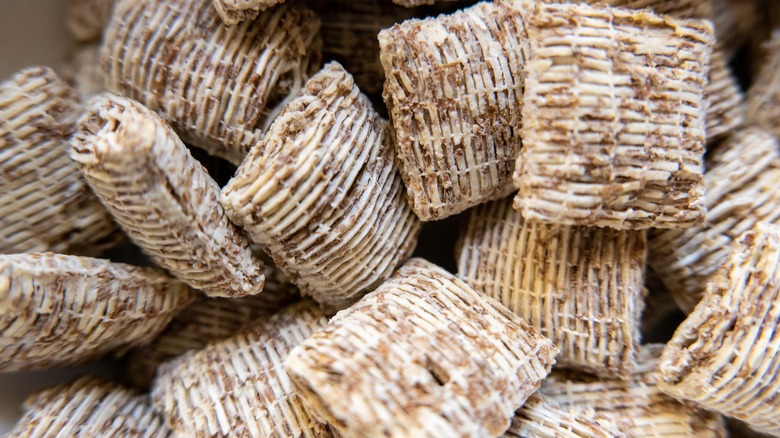There Are 2 Kellogg's Cereals You Want To Avoid Buying If You're Vegan Or Vegetarian
Part of following a vegan lifestyle is reading a lot of labels. Life would be a whole lot easier if all packaging included the iconic "V" label, but sadly, this is not the case. Sometimes, in the case of products like boxed cake mix, those who avoid animal products are pleasantly surprised to discover that it is indeed a vegan-friendly product without a label. But the opposite is also true — sometimes it's disappointing to discover a product that should be animal-free, like cereal, is not. It's even more shocking to see that some cereal isn't even vegetarian friendly.
One of the most popular brands of cereal, Kellogg's, offers two popular cereals vegetarians should avoid: Frosted Mini-Wheats and Lucky Charms cereals. These cereals contain beef gelatin, a byproduct derived from the hooves, bones, and connective tissue of cattle. Gelatin is most commonly used to make jello and marshmallows, and its bouncy consistency is what gives these foods their unique texture. For these cereals, it's used as a thickening agent for the frosting and in the marshmallow component. This is not the only controversy with Kellogg's, by the way.
Gelatin is really one of the only ingredients that would make a cereal not vegetarian or vegan — most of Kellogg's other cereals are in line with vegetarian standards. But remember: If the cereal contains marshmallows, double-check. Pork-based gelatin is a very common ingredient in marshmallows, popping up in other cereals within the Kellogg's brand, including the Rice Krispy Treat cereal — due to the marshmallows — and several varieties from the Malt-O-Meal brand.
Non-vegan ingredients to look out for in cereal
There are still plenty of vegan cereals out there that make for a healthy breakfast, but it might take time and patience locating them. Boxes that contain the vegan or vegetarian label are a lot easier to pick out, but when scanning the ingredients of cereals without this, there are a few key non-vegan ingredients to keep an eye for. The main animal-derived ingredients to look out for in cereal include honey, whey, milk, milk powder, lactose, yogurt, gelatin, and vitamin D.
Vitamin D is a tricky one — it might seem harmless, but it's often derived from linalool, from the wool of lambs. There is often no way to tell where the Vitamin D has come from by looking at the box. Sometimes it comes from a vegan source and is listed as so, but the only way to know for sure is to call the manufacturer and confirm.
The hack for saving time when scanning a cereal ingredients list is to check for allergens. All nutrition labels should include the word "allergens" in bold, with a list of possible allergens or simply stating "none". Dairy-derived ingredients are particularly difficult to spot as they go by many names — so the allergen list must state if any dairy-derived ingredient is present. This is also true for honey and eggs, but it's not foolproof. For example, gelatin is not a common allergen, so it wouldn't be listed here. If you have any doubts, be sure to dig a little deeper in order to ensure you're not being misled by vague labels.

